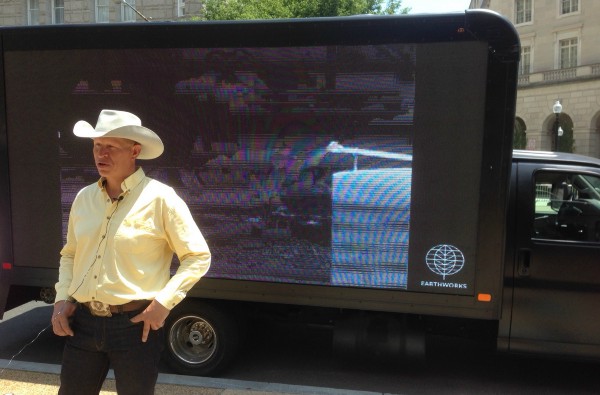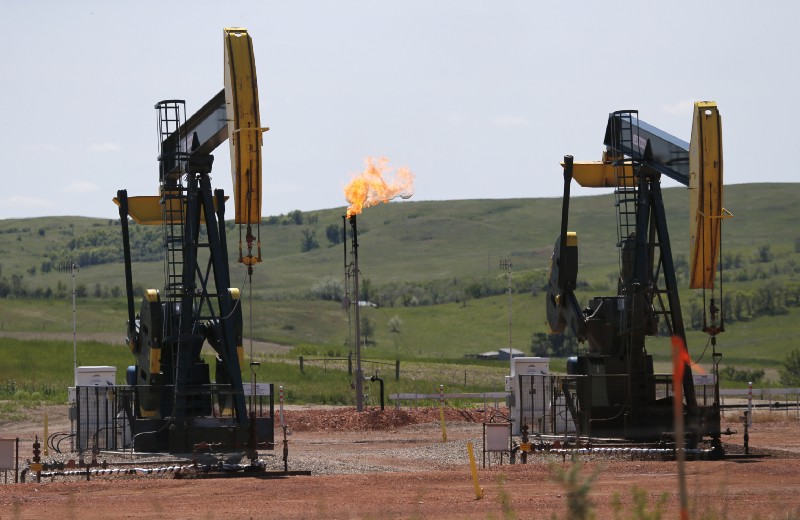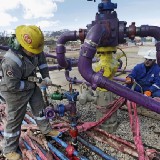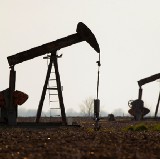Dozens of people showed up at the Environmental Protection Agency’s headquarters on Monday to speak out against the agency’s proposed two-year delay in the implementation of its methane rule for new and modified oil and gas drilling wells.
Opponents of the agency’s proposed delay dominated the public hearing. They cited health concerns and a lack of action by state regulators in their calls to keep enforcement of the methane rule on schedule. Only a small number of supporters of the delay, who complain the Obama-era rule will be costly and duplicative, showed up to testify at the hearing.
The Obama administration finalized the rule, known as the New Source Performance Standards, in 2016 as part of a federal effort to reduce the release of methane, a greenhouse gas with 25 times the warming potential of carbon dioxide. The oil and gas sector is the largest U.S. industrial emitter of methane, which is the second-biggest driver of climate change after carbon dioxide.
When the EPA announced the proposed delay last month, the agency said the extra time would allow it to review the rule’s potential negative impact on oil and gas drilling activities. Under the proposed two-year delay, companies would not need to comply with the requirements.
At the hearing, Barbara Gottlieb, director of environment and health for Physicians for Social Responsibility, told the three-member EPA panel that the scientific community now has multiple peer-reviewed studies that show a statistical association between living near an oil and gas drilling site and severe human health impacts that include cardiac, respiratory, cancer, and skin-based ailments.
By sealing leaks and capturing methane at oil and gas wells, companies do more than prevent the release of methane. They capture toxic and hazardous air pollutants, such as volatile organic compounds, that can cause severe health issues for people who live near the sites, Gottlieb told ThinkProgress after she testified. “If you seal the leaks and capture the escaping gases, you get it all,” she said in reference to all of the air pollutants captured.
Gottlieb emphasized that most of EPA’s professional staff “are knowledgeable, concerned, and really want to do the right thing by the American people.” But what EPA Administrator Scott Pruitt decides “remains to be seen,” she said.
The members of the EPA panel hearing testimony consisted of David Cozzie, group lead for fuels and incineration; Suzie Waltzer, team lead for the agency’s climate change division; and Allison Davis, an agency public affairs official.
Last week, the U.S. Court of Appeals for the District of Columbia Circuit ruled that the EPA could not suspend the methane rule. The agency on Friday asked the D.C. Circuit to delay its decision from earlier in the week requiring the agency to immediately resume enforcing the methane rule. The court ordered environmental groups to file their responses to the agency’s request by noon on Tuesday, with EPA’s reply to that due by 10 a.m. Wednesday, according to a Politico report.

With the legal back-and-forth occurring in the background, the EPA’s hearing on the proposed rule delay went on. Casey Camp-Horinek, a councilwoman with the Ponca Nation in Oklahoma, told ThinkProgress that her nation has been suffering “a form of environmental genocide” for generations primarily because of a ConocoPhillips refinery and tank battery and more recently because of the injection of fracking waste into deep wells and methane leaks in her north-central Oklahoma community.
Camp-Horinek, who was scheduled to testify at the hearing Monday afternoon, said the Ponca Nation reached out to Pruitt during his tenure as Oklahoma attorney general to help stop the pollution in the region, but little was done to help the residents. “We’re not feeling any response from Scott Pruitt except to create even more situations for us where they are loosening the regulations for all of the extractive industries,” she said. “We knew it would happen because of his ties to the oil and gas industry.”
Putting Pruitt in charge of the EPA “was like putting Custer in charge of the Bureau of Indian Affairs,” Camp-Horinek said. “We have someone who hates the agency that he’s in charge of. I believe that he’s put in there strictly to dismantle it and to create a safe haven for all of his cronies,” she added.
Environmental groups have attacked the proposed delay, with the Environmental Defense Fund pointing to the fact that the EPA’s own announcement acknowledged that the delay may make have a disproportionate impact on children’s health, “but argues that more illness for only two years is acceptable.”
David McCabe, a senior scientist with Clean Air Task Force, said in a Monday statement that the Trump administration is trying to give the oil and gas industry a two-year pass on “commonsense measures like checking their new wells for leaks.”
The EPA should focus on protecting the health of communities affected by oil and gas industry activities, and enforcing the standards on the books, rather than trying to dismantle them, McCabe said.
Rev. Mitchell Hescox, president and CEO of The Evangelical Environmental Network, testified that he organized an informal meeting of officials from the natural gas industry and staff members of the EPA about the rule for methane emissions at new oil and gas wells. In that 2015 meeting, none of the industry officials had an objection to the forthcoming new performance standards, Hescox said.
“There is no commonsense reason to stop the methane standard,” Hescox said in an interview after testifying. “There has to be some political reason for doing that and it’s not to support children’s health. For us, it’s all about children’s health. And we certainly get much more value protecting our children’s health than the few pennies it costs to stop the leaks.”
A new analysis released Monday shows that harmful air pollution from oil and gas activities and negative health effects are significantly correlated with proximity to oil and gas industry sites.
The analysis, performed by the FracTracker Alliance, uses the most recently available Census data and a commercial database of oil and gas wells drilled from September 2015 through February 2017. It shows populations at the state and county level that have cause for concern because they live in proximity to new oil and gas wells, but will be protected by the rule if Pruitt’s proposed two-year stay does not take effect.
In her testimony, Krystal Henagan, a Texas field consultant for Moms Clean Air Force, a nonprofit group fighting air pollution and climate change, said the people who live in the San Antonio metropolitan region depend on federal regulations to protect their health. Texas does not have strong environmental rules to protect residents, especially young children, from the impacts of oil and gas drilling occurring in the nearby Eagle Ford Shale region, she said.
“Postponing this rule is about protecting the oil and gas industry and that is unacceptable,” Henagan told the EPA panel.


